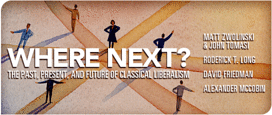by Matt Zwolinski
In David Friedman’s first essay, he expressed concern that our original 3000+ word essay omitted a discussion of the connection between classical liberalism and utilitarianism. In his most recent essay, he again defends his utilitarianism against our social justice, as both more historically in line with the classical liberal tradition and as more philosophically defensible on its merits.
It is, of course, relatively easy to leave things out of a 3,000 word essay on a topic as capacious as the history of classical liberal thought. It is even easy to leave things out of an 80,000 word book on the topic, and we fully expect to do so.
But our omission was not meant as a slight. Utilitarianism has indeed played a significant role in the development of classical liberalism, though it has typically been a utilitarianism of a distinctively non-Benthamite sort. Not that Bentham did not have his impressively libertarian moments. But it is with good reason that utilitarians like Mill and Spencer believed that human happiness could not be advanced, nor human liberty preserved, without rather strict adherence to rules which themselves made little reference to matters of utility.
As David notes, utilitarians care about the poor in the same way they care about everyone else: their interests are to be taken into consideration equally along with the interests of everyone else. Advocates of social justice, in contrast, seem to care about the poor in a deeper sort of way: in Rawls’ version, the interests of the least well-off have a very strong moral priority over the interests of everyone else.
This is a fine and important distinction for philosophers to make. But it’s worth noting that for most of the real world problems that the classical liberals were concerned about, it is a distinction without a difference. Are we concerned with the poor because their interests qua poor have a special non-derivative moral significance? Or are we concerned with the poor because we believe that governments have an obligation to serve the interests of all their citizens, and the poor are the ones who are most likely to suffer when governments fail in this obligation? In both cases, a special sort of concern for the poor is warranted. Philosophers can come up with thought experiments in which these two sources of concern come apart. But in cases ranging from Smith’s discussion of the mercantile system, to Spencer’s discussion of poor laws, to Tucker’s discussion of the money monopoly, they converge. The government policies against which classical liberals inveighed most loudly were ones that were bad on utilitarian grounds, bad on natural rights grounds, but especially bad for the poor.
Again, we do not wish to claim that the early classical liberals had a fully fleshed out conception of social justice. What we are claiming is that they had a concern for the poor, whether derivative or non-derivative, that played an important justificatory role in their theory, and that would not be incompatible with a fully fleshed out conception of social justice that might be developed today. [1]
While we’re at it, we should note that our talk of “concern for the poor” has been a bit sloppy as a way of characterizing social justice, both as a philosophically defensible idea and as one with roots in the classical liberal tradition. Those who are concerned with social justice will, it is true, often be concerned about poverty. But on the most plausible conceptions of social justice, and on the conceptions that resonate most strongly with the classical liberal tradition, poverty as such will be neither a necessary nor a sufficient condition for having a valid claim of social justice. Some people will be poor but have no such claim—lazy surfers who are poor simply because they choose not to work, for example. Others will not be poor but will have a legitimate claim of social justice—those, perhaps, whose opportunity to live according to their religious beliefs is unfairly restricted by political institutions. There’s more to social justice than ensuring that people have enough money, and this, in our opinion, is an area in which the classical liberal tradition simultaneously shines and nevertheless still has some important work to do.
Note
[1] Such as that developed at length by my co-author, John Tomasi, in Free Market Fairness (Princeton University Press, 2012).

